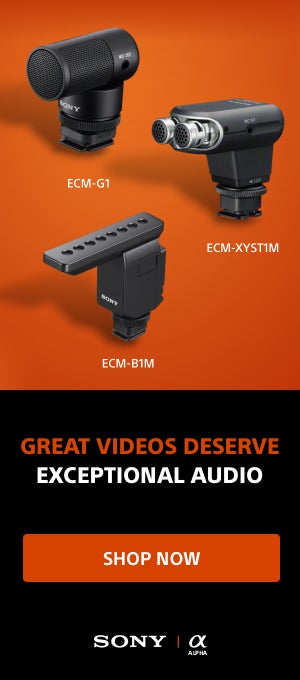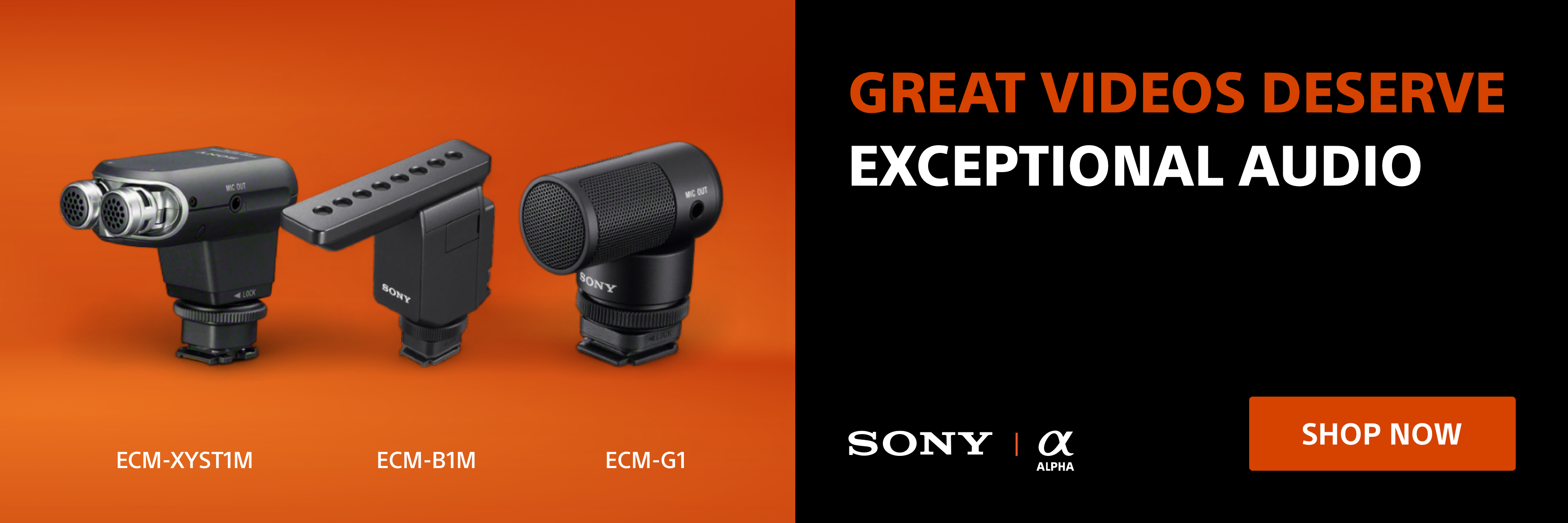Colette Peri (@colette.peri) is a photographer and creative most known for her stop-motion animation work. She creates stand-out stop-motion videos that have become popular among many brands, and she also happens to be a member of the first class of Alpha Female Creators-In-Residence. We talked with her to learn more about the Sony Alpha mirrorless gear she uses for her impressive stop-motion work and why.
I shoot stop-motion videos for brands, people and products, so my kit has to be versatile for shooting in-studio and outdoors/on-location. Below is my trusty list of all my favorite gear and an explanation of why each earns a spot in my bag.
See the Sony Alpha gear inside Colette Peri’s kit for stop-motion animation.
Lenses
Sony 16-35mm f/2.8 G Master: I love using this lens in situations where I want to emphasize scale, like stop-motion within landscapes. It also comes in handy when I’m shooting overhead in-studio and need to fit more in frame! In this photo I was able to show the expansive atmosphere of Grand Central Station with the Sony 16-35mm f/2.8 GM. I love that it allowed me to pan upwards in post and show off the beautiful ceiling as well as all the action happening on the ground floor!
Sony 24-70mm f/2.8 G Master: This is my most-used lens, in-studio and out. It’s versatile, sharp, and almost never leaves my camera. In the video below for Fjällräven, I was able to style the flatlay grid of items and then adjust the focal length of the lens accordingly. I don’t always know what the distance between my camera and subject will be beforehand, or how large the scene I’m shooting will be, so the Sony 24-70mm f/2.8 GM is most often my reliable best bet.
Sony 70-200mm f/2.8 G Master: I use this lens to shoot stop-motion wedding ceremonies. I like to be far away and still get those close-up details of the day. When capturing the kiss during this wedding ceremony, I was on an upper balcony super far away from the couple. The Sony 70-200mm f/2.8 GM helped me capture the emotion and detail of this special moment— without interfering with the ceremony at all!
Sony 85mm f/1.4 G Master: This is my go-to when I want a beautiful, soft background behind either a product or portrait. The shoot below was all about capturing the deliciousness of a plant-based burger. The Sony 85mm f/1.4 G Master allowed me to showcase the juicy details in all their glory, while dropping out the background.
Cameras
Sony α7R III: Before I switched to shooting with Sony gear, I rented the α7R III for one month. The day I had to send it back, I went online and bought it. I literally couldn’t live without it! This camera is my go-to for stop-motion in studio, and it really sold me with features like focus peaking, the 42 Megapixel Sensor, articulating LCD screen, and the compact size compared to what I was shooting with before. With stop-motion, α7R III allows me to have full control in manipulating my images in post— capturing so much data that gives me confidence to crop in, pull out shadows and adjust coloring.
Sony α9: When I shoot stop-motion outside my studio, I bring my Sony α9. This is because I’m often capturing moments as they happen rather than getting to direct the motion. For example, when I’m shooting a stop-motion wedding video, I like to use the camera’s 20fps burst mode and remove frames in post for key moments like the first look or the kiss and “I do”. The best part? It’s SILENT during these special moments. The camera can shoot 241 RAW full-frame photos in a row, with no audio and no blackout.
Sony RX100 V: This camera is impressing me more and more each day. I recently brought it traveling to Japan as a secondary camera to the α9. I shot stop-motion with it on-the-go in train stations, supermarkets, shrines and more. I love how small and lightweight it is, yet it’s proven to be extremely powerful especially for outdoor stop-motion. When I’m shooting just for fun and to post on social media, it’s all I need.
Accessories
Dracast Fresnel 2000 Daylight LED Light and 2 Dracast LED 1000 Pro Daylights: These are the light I most-often use to light my stop-motion scenes in the studio.
Manfrotto BeFree Compact Travel Carbon Fiber Tripod: This is the tripod I bring with me for anything outside the studio. It’s lightweight enough for travel, but sturdy enough for stop-motion.
C-Stand + Manfrotto 143BKT Camera Bracket: When shooting overhead flat lay stop-motion, I use a c-stand with a bracket to mount my camera on the end. This set-up is a game changer!
Benro Carbon Fiber Tripod: This is my in-studio tripod. It’s sturdy, reliable, and I’ve had it since the start!
LaCie 4TB Rugged Hard Drive: When in-studio, I tether my camera to my computer and the files write directly onto my LaCie harddrive.
Sony 64GB SF-G Tough Series UHS-II SDXC Memory Card: When out of studio, I use Sony TOUGH cards (64GB) because I can never trust myself to not drop them and they’re super reliable.
Batteries: Stop-motion takes up lots of battery! I always have extras on hand for every camera.
Color Checker: You need to shoot in FULL manual for stop-motion, so I insert my color checker in frame for one image before I start shooting and use it to adjust the white balance in post.
Tether Tools TetherPro Cable: This is the cord I use to tether my α7R III to my laptop with. I like that it’s bright orange so I can always find it, and never trip on it!
Putty/Glue Dots/Wire/Clamps: I always have these little items on hand while animating, in case I need to rig a product to make it fly, or hold something in place to make sure it doesn’t move between frames.
Seamless Paper Rolls: I love these colorful paper rolls for stop-motion backdrops. I have almost every color!
Sony Wireless Remote Commander: I use this when shooting without Dragonframe, so for weddings and anything outdoors. It’s good to use a remote to avoid camera shake when clicking the shutter!
Diffuser: I love this for emulating window light.
DragonFrame software and Remote: I use Dragonframe to assist while animating. It comes with a physical remote so I can be far from my camera while shooting. Dragonframe has awesome features for stop motion such as onion-skin and live view.
See more of Colette’s work at coletteperi.com and watch her walk through her gear in the video below:



